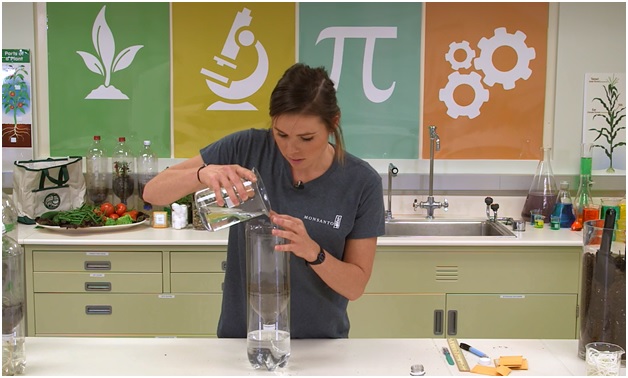News | May 1, 2017 | Read Time: 4 minutes
Curious Kids Discover the Wonder of Modern Ag Through STEM


Recently, I was invited to speak to a group of lively fifth graders about science. I knew they were eager to dive right in, and I assumed this talk would be like other outreach events. But this meeting was different. Instead of presenting at a school to students, I was invited to give a summer camp presentation to about 50 members of a Girl Scouts troop and their parents.
Parents were asked to tagalong with their daughters for a day filled with science, technology, engineering, and math (STEM) experiences with the goal of taking some knowledge back to other troops. I kicked off the presentation by asking everyone to point to the scientist in the room. Not surprisingly, the girls and parents pointed to me, but I pointed to them. But after asking them a series of questions – “Who here likes to build things?” “Who likes to ask questions?” “Who enjoys working with others?” – I told them they all have characteristics needed to be an engineer or scientist. STEM is for everyone, and with a little encouragement and mentoring, any student can pursue these fields. They just need to know how to do it.
Throughout the rest of the afternoon I showed them how to extract DNA from strawberries. The most exciting step of the experiment is when the household chemicals we’ve mixed together cause the white, bubbly strawberry DNA mass to float to the top of the solution. Typically, the kids giggle or compare it to snot, but this time something poignant happened.
It was as if time suddenly stood still. The room fell quiet. All I could see were parents hovering over the experiments with their daughters, in total awe. That’s when I was reminded that whether you’re a kid or adult, science is truly for all. Science is fun and fascinating and can make the learner feel important, gaining tokens of information they didn’t have before. Most importantly, I observed a group of people who want to be on the side of science, want to know more, and use the scientific method to explore and make decisions based on evidence. Sometimes students need to have an exciting moment, like the troop members had extracting strawberry DNA, to be reminded that it’s okay to ask questions, it’s okay not to know the answer, and it’s okay to change your answer after learning more about a topic.


These are the thrilling moments we aim to raise in more communities. Monsanto is a collection of creative, intelligent, and extremely passionate individuals who on top of their 50-60 hour work weeks ask to do more, especially throughout the communities in which they live.
Monsanto has thousands of job sites around the world, and in many of those locations we have STEM outreach activities aiming to excite kids about science. In Brazil, employees invested in sparking Gen Z’s interest in sustainable farming through a video game. In India, employees visited auditoriums filled with curious kids who want to learn more about biotechnology. In the Philippines, a children’s book aimed at elementary school students was written by a Monsanto employee. The book tells the true and inspiring story of how agricultural biotechnology seeds positively transformed a woman farmer’s life and enabled her farming community to recover economically in the aftermath of a devastating typhoon.
And across the United States employees are visiting libraries, judging science fair projects, hosting STEM nights and bringing science into the classroom. Last year, the Monsanto site in La Jolla, California hosted an interactive session on microbials with 40 middle school students. Earlier this year, 120 bright ninth grade girls visited the Chesterfield, Missouri Research Center for an all-day STEM event in tandem with Google and Starbucks.
From synthetic biology to robotics, microbials and everything in between, modern agriculture is dependent on curious and creative minds working together to invent new solutions to challenges facing the planet. There is no one solution, person, or company that can provide these answers. It will take all of us.
If you would like more information on the outreach program, email stemeducation.outreach@monsanto.com. Want to do easy STEM activities with your friends? Check out our experiments on Vimeo.
Have a question? Tweet me: @vbayes.









